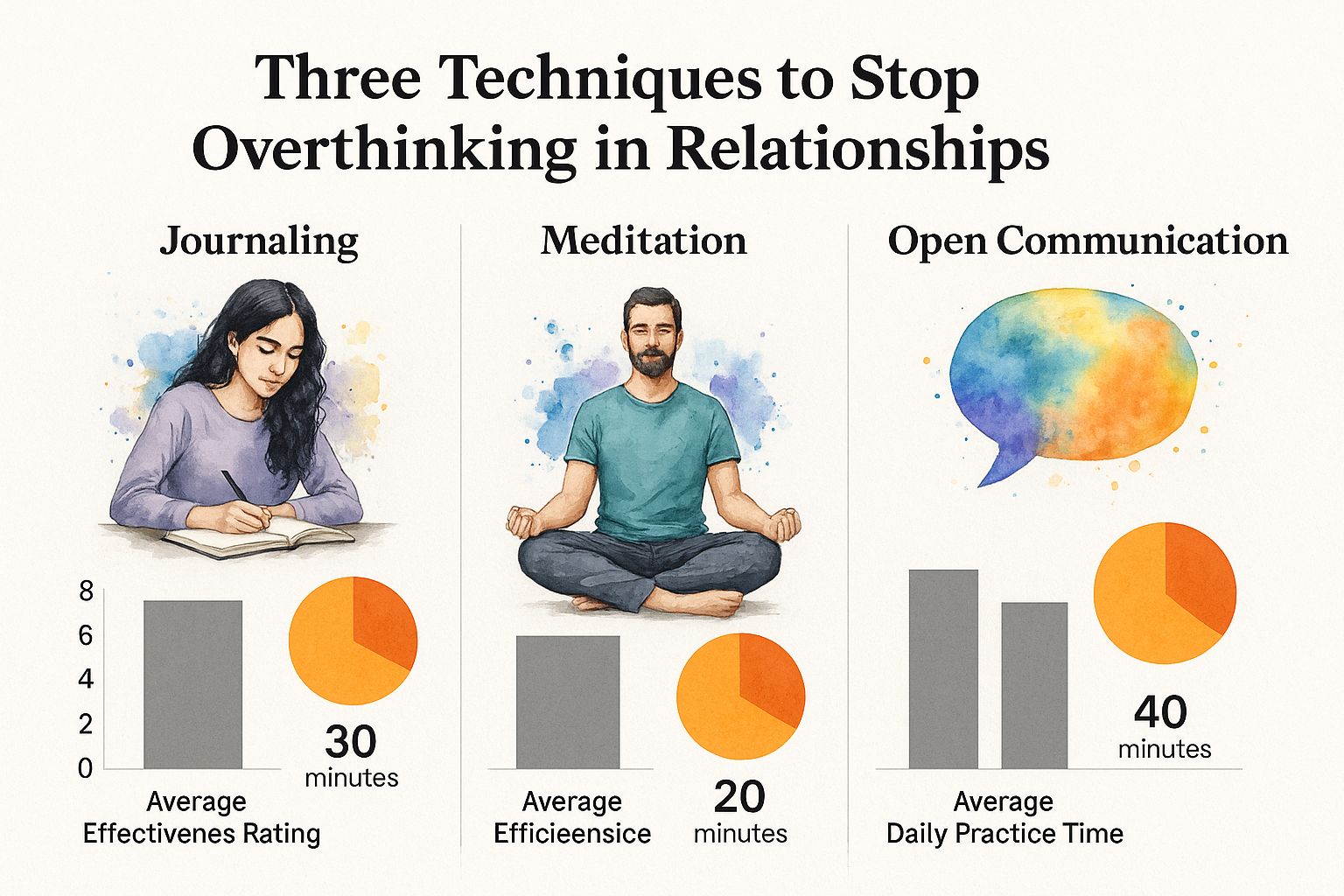To stop overthinking in a relationship, you have to get to the root of it. It’s not just about telling yourself to "stop worrying." You need to understand why your brain is spinning out in the first place, and then learn how to gently challenge those anxious thoughts with a bit of self-compassion.
Most of the time, those mental spirals are fueled by old hurts and insecurities, not what’s actually happening in your relationship right now. Once you start to see that, you can begin to build real trust—both in your partner and, more importantly, in yourself.
Why We Overthink in Relationships

If you find yourself constantly caught in a loop of "what-if" scenarios, playing out every possible disaster in your head, you're definitely not alone. Overthinking isn't a sign that you're broken; it's a deeply human survival instinct that’s just started to work against you.
At its core, overthinking is your brain’s clumsy attempt to protect you from getting hurt again. It tries to control every possible outcome so you'll never be blindsided.
This protective drive is often wired into us by our past. A painful breakup, a betrayal, or just feeling deeply misunderstood in a previous relationship can leave behind a kind of emotional scar tissue. Your mind remembers that pain and goes on high alert, scanning for any sign that history might be repeating itself. Suddenly, a simple delayed text message can trigger a whole catastrophic story about being abandoned.
Overthinking is not a character flaw. It’s a signal that a part of you doesn't feel safe, and it's trying to protect you from getting blindsided again. Acknowledging this is the first step toward genuine change.
This pattern is tied directly to our fundamental need for security. When we don't have a strong, internal sense of our own worth, we start looking to our partners to provide it for us. And that’s exactly where overthinking finds its fuel.
The Role of Insecurity and Past Pain
Insecurity acts like a powerful megaphone for anxious thoughts. When you're already doubting your own value, it becomes incredibly easy to second-guess your partner’s feelings and intentions. You might find yourself needing constant reassurance or reading into neutral actions as proof of their disinterest. It's a common spiral, especially if you've ever found yourself wondering why men pull away just when things seem to be going great.
Research backs this up. A 2022 mental health survey showed just how much our romantic past shapes our present, revealing that 77% of people feel their past relationship hardships bleed into their current ones. The study found that 35% admitted to increased distrust and 30% reported lower self-esteem directly because of what they'd been through before. You can dive deeper into the findings in the full study from Thriveworks.
To help you connect the dots in your own life, it’s useful to see how certain behaviors link back to deeper-seated fears.
Common Overthinking Triggers and Their Roots
This table breaks down some common overthinking habits and connects them to the potential psychological drivers behind them. Recognizing your own patterns here is a huge step toward understanding them.
| Overthinking Behavior | Potential Underlying Cause |
|---|---|
| Constantly replaying conversations in your head | Fear of having said or done the "wrong" thing; seeking perfection |
| Needing frequent reassurance of their feelings | Low self-worth; fear of abandonment |
| Assuming the worst from a delayed text or call | Past experiences of being ignored or ghosted; anxiety about losing connection |
| "Mind-reading" or guessing their thoughts | A learned coping mechanism to anticipate threats or disapproval |
| Comparing your relationship to others (online or IRL) | Insecurity about whether your relationship is "good enough" or "normal" |
| Obsessing over their social media activity | Distrust; fear of being replaced or of infidelity |
Looking at this, you might see a bit of yourself in one or more of these patterns. That's completely normal.
Ultimately, getting a handle on why you overthink is the most critical piece of the puzzle. It allows you to approach the issue with compassion for yourself instead of criticism. Pinpointing these triggers isn't about blaming your past; it's about building the self-awareness you need to finally dismantle the pattern. When you acknowledge the protective, albeit misguided, intention behind your anxiety, you lay a much kinder foundation for making a real change.
Actionable Ways to Break the Rumination Cycle
When your mind gets stuck replaying conversations or imagining worst-case scenarios, you need some real, concrete tools to break the spell. Figuring out why you overthink is a great first step, but taking action is how you truly reclaim your peace of mind.
The goal isn't to wrestle your thoughts into submission—that usually just makes them stronger. Instead, the trick is to gently redirect your mental energy and interrupt the anxious pattern before it really gets going.
Let's use a classic example: your partner's texts suddenly get shorter. The overthinking brain doesn't wait for evidence. It immediately jumps to conclusions like, "They're mad at me," or "I must have said something wrong and now they're pulling away." Before that story spirals out of control, you can step in with a conscious strategy.
Use Thought-Stopping and Grounding
The second you catch yourself falling into that familiar loop, you can use a simple cognitive trick called thought-stopping. This isn't about forcefully shoving the thought away, which almost always backfires. It's more like putting up a gentle but firm mental stop sign.
You can do this by silently but firmly telling yourself, "Stop," or "Enough." Some people I've worked with find it helps to actually visualize a bright red stop sign in their mind. This tiny interruption creates just enough of a pause for you to pivot.
What you do next is critical: immediately follow up with a grounding technique. Grounding yanks you out of your anxious head and plants you firmly back in the present physical moment.
- The 5-4-3-2-1 Method: This is a classic for a reason. Look around you and name five things you can see. Then, name four things you can physically feel, three things you can hear, two things you can smell, and one thing you can taste. This sensory-focused exercise forces your brain to pay attention to your environment, not your internal drama.
- Physical Sensation: Try holding a piece of ice, splashing your face with cold water, or just pressing your feet hard into the floor and noticing the pressure. An intense physical sensation like this can act as a powerful circuit breaker for obsessive thinking.
Schedule a Designated "Worry Time"
This next strategy might sound completely backward, but it’s a game-changer for so many people. The idea is to schedule a specific, limited time to worry. By doing this, you're acknowledging your brain's need to process these anxieties, but on your terms—not whenever they feel like crashing your party.
Here’s how it works in practice: set aside 15-20 minutes every day—let's say 5:00 PM—as your official "worry time." If an anxious thought about your relationship pops up at 10 in the morning, you simply acknowledge it and tell yourself, "Thanks for the heads-up, brain. I'll deal with this at 5:00 PM."
When you give your anxieties a specific appointment, you take back control. You’re no longer at the mercy of random thought spirals; you’ve put them on your calendar, and they must wait for you.
During that scheduled time, you have full permission to analyze, dissect, and ruminate on whatever’s on your mind. What's amazing is that by the time 5:00 PM rolls around, the issue often feels way less urgent. Sometimes, it has even resolved itself. This practice trains your brain that most worries aren't the five-alarm emergencies they pretend to be, helping you become less reactive over time. To actively work on breaking the rumination cycle, exploring techniques like mindfulness-based stress reduction can also be incredibly helpful.
It’s all too easy to get completely lost inside your own anxious mind, but let's be real—overthinking is rarely a solo activity. While you're trapped in that dizzying spiral of worry, your partner is on the other side of that emotional wall, and trust me, they're feeling the effects just as deeply.
That constant need for reassurance, a classic symptom of relationship anxiety, can put a heavy weight on their shoulders without you even realizing it.
What feels like a necessary quest for certainty to you ("Are you sure you're not mad?" or "Do you really still love me?") can feel like an endless test to your partner. And it's a test they can never seem to pass. Every time you seek that hit of comfort, it can slowly chip away at their feeling of being trusted and believed.
This cycle often leads to something I call partner fatigue. Your partner might start to feel like nothing they say or do is ever enough to make you feel secure. They can get exhausted from having to constantly prove their love and commitment, which often causes them to pull back and become emotionally withdrawn. It’s a defense mechanism.
It's a painful irony, isn't it? Your overthinking is often a misguided attempt to protect the very connection you value so much. But by creating an atmosphere of doubt and scrutiny, it can slowly poison the intimacy and trust you're so desperate to preserve.
Getting your head around this isn't about blaming yourself. It’s about recognizing the unintended ripple effects. When you can genuinely see the situation from your partner's perspective, it becomes a powerful motivator for change.

From Neutral Actions to Negative Assumptions
One of the most damaging ways overthinking hurts a relationship is by painting perfectly neutral actions with a negative brush. Your brain, already primed by anxiety, goes hunting for evidence to confirm its worst fears, and it's not afraid to twist reality to find it.
Think about these all-too-common scenarios:
-
The Scenario: Your partner gets home from work and is unusually quiet.
-
The Overthinking Brain: “They’re mad at me. I must have done something wrong. They’re rethinking our entire relationship.”
-
The Reality: They had a nightmare of a meeting and are just mentally fried, needing a few minutes of silence to decompress.
-
The Scenario: They don't immediately "like" the cute photo you just posted of the two of you.
-
The Overthinking Brain: “They’re embarrassed by me. They don’t want people to know we’re together. Are they hiding something?”
-
The Reality: They haven't checked their phone in three hours. They simply haven't seen it yet.
This pattern creates a constant, low-level tension where your partner might feel like they have to walk on eggshells. They become hyper-aware that any small, unintentional move could be misinterpreted and set off a new cycle of anxiety and questioning. Living in that state of high alert is exhausting for both of you, and it eats away at the spontaneous, easy connection that makes a relationship feel safe and joyful.
The impact of this is very real and well-documented. A longitudinal study of nearly 4,800 couples found that one partner's anxiety directly correlated with how the other partner felt about the relationship's quality day-to-day. The research showed that anxiety was more likely to undermine positive feelings like support and intimacy than it was to cause outright fights.
If you're interested in the science, you can learn more about these relational dynamics and how they play out. Recognizing this impact is a huge first step toward building a healthier dynamic for both you and the person you love.
Building an Internal Foundation of Security
Let's be honest: that constant, nagging need for your partner’s validation is exhausting. The truth is, genuine security in a relationship doesn't come from their endless reassurance. It's an inside job. Building this internal fortress is, without a doubt, the most powerful way to stop overthinking for good.
This whole process really starts when you shift your focus. Instead of looking outward for proof of their love, you start cultivating an unshakable sense of safety within yourself. It’s all about learning to trust you, even when those familiar waves of uncertainty start to creep in.
Silencing Your Inner Critic With Self-Compassion
That harsh inner critic is usually the one fanning the flames of your overthinking. It’s that little voice whispering that you’re not enough, that you’re going to mess it up, or that you’ll eventually be left behind. Self-compassion is the perfect antidote.
Instead of battling these thoughts head-on, try something different: acknowledge them with kindness. Think about how you’d talk to a scared friend. You wouldn’t yell at them to "just stop worrying," right? You’d offer comfort, a listening ear, and some gentle understanding.
Next time you feel that spiral starting, try this simple act. Place a hand over your heart and quietly say something to yourself like:
- "This is a really hard moment."
- "It's okay that I'm feeling this way."
- "I'm going to be kind to myself right now."
This small gesture can physically interrupt the cycle of self-criticism and dial down the emotional intensity behind the overthinking. You’re teaching your nervous system that you are a safe place for yourself, which is the bedrock of real, lasting security. You can find more powerful exercises like this in our complete guide to relationship therapy techniques.
The goal isn’t to magically eliminate anxious thoughts. It's to change your relationship with them. When you meet anxiety with compassion instead of fighting it, you strip away its power.
Rebuilding Trust in Your Own Judgment
Overthinking often grows from the roots of deep-seated insecurities or a history of not-so-great experiences. When low self-esteem is in the driver's seat, you're far more likely to interpret a perfectly innocent action as a sign of looming rejection. As noted by counselingcentergroup.com, these insecurities are a major source of overthinking, but mindfulness practices can be an effective tool for breaking the cycle.
One of the best ways to rebuild this trust is through mindfulness. And no, it’s not about emptying your mind completely. It’s about learning to watch your thoughts float by without getting swept away by the current.
Start with a really simple exercise. For just two minutes, sit quietly and bring your focus to your breath. When a thought pops into your head—and it absolutely will—just label it "thinking" and gently bring your attention back to the sensation of breathing.
This practice helps you realize a profound truth: you are not your thoughts. You are the one observing them. Over time, you build a tiny but crucial gap between a feeling and your reaction. That gap gives you the power to choose your response instead of being hijacked by anxiety.
This is how you reclaim trust in your own gut feelings and learn to sit with uncertainty, knowing deep down that you have the inner strength to handle whatever comes your way.
When a relationship feels uncertain, our minds have a nasty habit of filling in the blanks. Overthinking absolutely loves those gray areas, spinning wild stories from unspoken assumptions and quiet moments. The best way to short-circuit this spiral? Clear, open, and consistent communication. It turns moments of anxiety into real opportunities for connection.
This isn't about demanding your partner fix how you feel. It's about a fundamental shift—moving away from pointing fingers and toward sharing what's actually going on inside your head. When you replace fearful assumptions with an open dialogue, you cut off the overthinking spiral right at the source.
Frame Your Needs with 'I Feel' Statements
When that familiar wave of anxiety starts to build, it's easy to lash out, even without meaning to. We've all been there. Phrases like "You never text me back" or "You're being so distant" feel like accusations, and they immediately put your partner on the defensive. Suddenly, a small worry escalates into a full-blown conflict.
A much better way forward is to use "I feel" statements. This simple but powerful technique centers the conversation on your emotional experience—which is your truth—instead of your partner's actions, which can always be debated.
Here's the basic recipe:
- "I feel [your specific emotion] when [a specific, non-judgmental behavior happens] because [the story I'm telling myself is…]."
Let's see it in action. Instead of asking, "Why are you being so quiet? Are you mad at me?" try this:
"I'm feeling a little anxious that things are quiet between us. I start to worry that I might have done something to upset you. Could you let me know where your head's at?"
See the difference? This approach is vulnerable, not accusatory. It invites your partner to provide clarity and comfort rather than forcing them into a defensive crouch.
Ask for Reassurance in a Healthy Way
First things first: needing reassurance is completely normal. It’s human. The trick is to ask for it in a way that builds trust instead of creating pressure. Rather than peppering your partner with repetitive, anxiety-fueled questions, you can frame your need as a simple request for connection. For more tips on navigating these conversations, check out our guide on how to handle conflict in relationships.
The image below compares a few different techniques for managing overthinking, and you'll notice how powerful direct communication really is.

While personal practices like journaling and meditation are fantastic tools, the data shows that open communication offers one of the biggest bangs for your buck, calming anxiety with a relatively small time investment.
We can see how this plays out in our daily interactions. Often, the habits we fall into during conversations can either pour fuel on the fire of overthinking or help put it out.
Destructive vs Constructive Communication Habits
| Destructive Habit (Fuels Overthinking) | Constructive Alternative (Reduces Overthinking) |
|---|---|
| Mind Reading: "I know you're mad at me." | Asking Directly: "I'm sensing some distance. Is everything okay?" |
| Using Absolutes: "You never listen to me." | Being Specific: "I felt unheard when we discussed our plans earlier." |
| Silent Treatment: Shutting down and refusing to talk. | Asking for Space: "I need a little time to process. Can we talk in an hour?" |
| Blaming: "You made me feel this way." | Using "I" Statements: "I feel hurt by that comment." |
Little shifts like these can make a world of difference. Moving from destructive to constructive habits isn't just about avoiding fights; it's about building a foundation of trust where overthinking can't easily take root.
Establish Regular Check-In Conversations
Don't wait until you're in a full-blown panic to talk about your insecurities. One of the best proactive things you can do is schedule a regular, low-pressure "relationship check-in." This creates a safe, expected time to discuss how you're both feeling before those feelings have a chance to fester.
This doesn't have to be a formal meeting. It could be a weekly chat over coffee where you both share:
- One thing you appreciated about the other person this week.
- One thing that felt a bit challenging or made you feel insecure.
- One thing you're looking forward to doing together.
Just knowing you have this dedicated space makes it so much easier to let go of smaller anxieties during the week. You can trust that they'll be addressed. It transforms communication from a reactive, damage-control tool into a proactive ritual for building a secure, deeply connected partnership.
Your Questions About Overthinking Answered

As you start using these strategies, you're bound to run into some specific questions. It's one thing to read about these concepts, but it's another thing entirely to apply them when you're feeling anxious.
Let’s tackle some of the most common questions that come up when people are learning to quiet the noise of overthinking in their relationships.
How Can I Tell the Difference Between Intuition and Overthinking
This is a big one, and it can feel incredibly confusing in the moment. The clearest distinction often lies in the feeling behind the thought, not just the thought itself.
Intuition—that "gut feeling"—usually shows up as a quiet, calm sense of knowing. It’s a simple, clear signal that doesn't bring a ton of mental debate with it. It often feels like a sudden moment of clarity, even if the message is tough to swallow.
Overthinking, on the other hand, is loud. It's chaotic, repetitive, and fueled by anxiety. You'll find yourself stuck in thought loops, dissecting every tiny detail, and building a mountain of frantic "what-if" scenarios. Your mind feels like it's spinning its wheels, and the whole process is just plain draining.
A great way to check in is to notice how your body is reacting. Intuition often brings a sense of calm, or even relief. Overthinking almost always feels stressful, tense, and exhausting.
What If My Partner Is Actually Doing Things That Make Me Anxious
This is a crucial reality check. Your anxiety isn't always created in a vacuum; sometimes, it’s a perfectly valid response to real problems in your relationship. You have to learn to separate your internal overthinking habits from legitimate issues sparked by your partner’s behavior.
If your partner is consistently crossing your boundaries, being disrespectful, or creating instability—maybe by being secretive, unreliable, or constantly dismissive—then your anxiety is probably a healthy alarm bell. In that case, the solution isn't just about managing your thoughts. It’s about addressing the problematic behavior head-on.
Use those assertive "I feel" statements we talked about earlier to explain how their specific actions are affecting you. If you've communicated clearly and the behavior doesn't change, it might be time to think about whether the relationship is healthy or if couples counseling could help.
How Long Does It Take to Stop Overthinking in a Relationship
Breaking the overthinking habit is more like building a muscle than flipping a switch. It's a process, not an overnight fix. These are often deeply ingrained mental patterns we’ve developed over years, so changing them requires real patience and consistent practice.
How quickly you see progress really depends on how consistently you use the tools you're learning, like mindfulness, cognitive reframing, and better communication.
- Some people feel a real shift in their anxiety levels within a few weeks of dedicated effort.
- For others, it might take a few months to forge strong, new mental habits.
The most important thing is to be kind to yourself through it all. Focus on celebrating the small victories, like noticing you’re in a thought spiral and successfully shifting your focus. Aim for progress, not perfection. Every single time you interrupt that cycle, you are actively rewiring your brain for more peace and security.
At Poke Match, we believe everyone deserves a relationship that feels safe and supportive, not stressful. Our expertly crafted articles provide the insights and practical strategies you need to build healthier, more connected partnerships. Explore more advice at https://poke-match.com.
